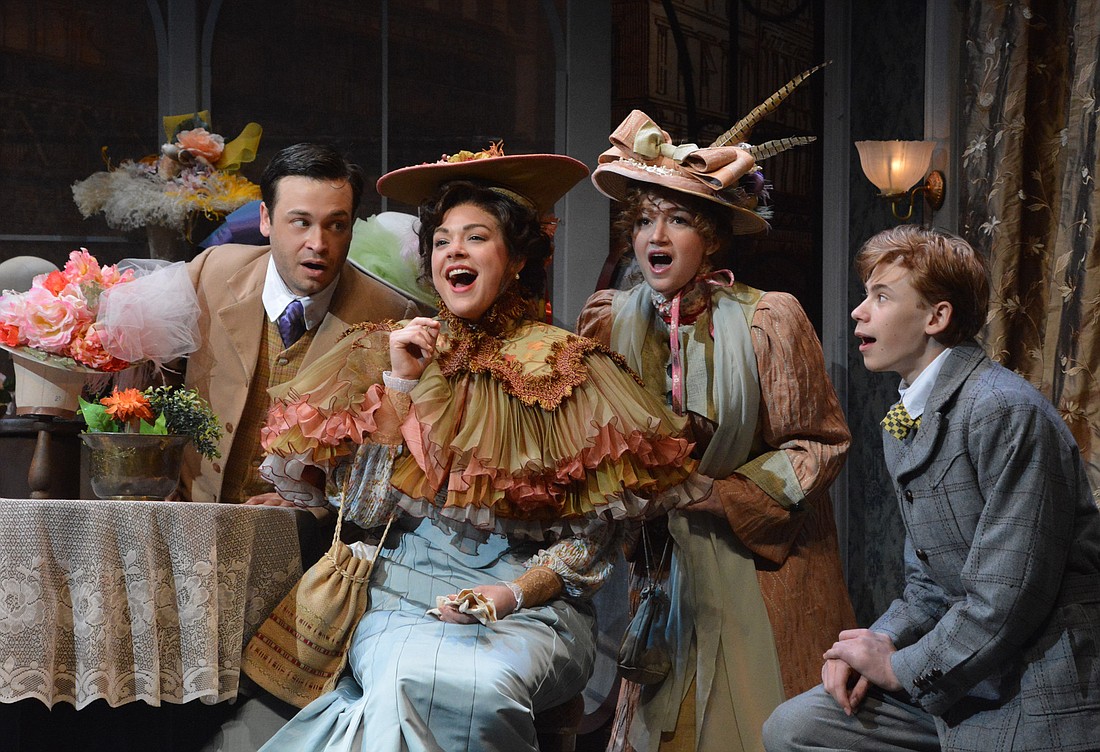- November 24, 2024
-
-
Loading

Loading

To some, bourgeoisie is the ultimate insult. Not to Thornton Wilder — based on the evidence of “The Matchmaker.” That play is the basis of “Hello Dolly” and the season-opening Asolo Rep production. It’s a celebration of marriage, money and all things middle class — an unapologetic love letter to the American Dream.
The dream takes place in Yonkers, N.Y., before the dawn of the 20th century. Dolly Levi (Peggy Roeder) is the charmingly manipulative, 50-something matchmaker in question. Her latest assignment: Horace Vandergelder (Steve Hendrickson), a cranky, well-to-do, middle-aged businessman with heroic sideburns. Dolly has the perfect match for him: herself. She doesn’t inform him of this fact until the final curtain is ready to drop. (She, of course, makes Horace think that it’s his idea.) The other American dreamers include Cornelius Hackl (Buddy Haardt) and Barnaby (Owen Teague) — the rich man’s overworked clerks who cut out on their job for a night on the town in New York City. (Their checklist includes adventure and a kiss by night’s end.) The lads convince two proper ladies at a hat shop (Olivia Williamson and Allie Henkel) that they’re two rich kids. Vandergelder’s niece (Andrea Adnoff) also tries to make a break for it to marry an aspiring artist (Paul Herbig) against her uncle’s wishes. They all, of course, wind up at the same swanky restaurant on the Upper East Side. Along the way, Doug Jones and David Breitbarth provide comic relief as a drunken Irish philosopher and a scowling horse-drawn carriage driver, respectively. Carolyn Michel does her best to unite any young lovers who stumble into her house, and a parrot (uncredited) squawks “Hello, Dolly!”
If you’re expecting a slow-moving, nostalgic parade, you’re probably thinking of the Barbra Streisand movie. Think again. “The Matchmaker,” at its heart, is classic farce — and like any good farce it moves in the fast lanes. Characters duck under tables and counters, make canned tomatoes explode, wrestle with room dividers and disguise themselves as members of the opposite sex.
It’s funny stuff. Director Peter Amster wrings every drop of laughter he can out of it but doesn’t skimp on the warmth or homespun philosophy. This is a Wilder play, after all.
Every actor gets a chance to shine and share their character’s philosophy, sometimes to each other and sometimes directly to the audience. These feel less like soliloquies and more like informal chats between friends.
Money is the No. 1 topic. And it’s hardly the root of all evil.
As Dolly tells us, “The difference between a little money and no money at all is enormous and can shatter the world. And the difference between a little money and an enormous amount of money is very slight, and that, also, can shatter the world.”
And, as Cornelius informs his fellow clerk, “Listen, everybody thinks when he gets rich he’ll be a different kind of rich person from the rich people he sees around him. Later on he finds out there’s only one kind of rich person. And he’s it.”
And — in the world according to Wilder — being a rich person isn’t bad. The problem isn’t money but what you do with it.
As Dolly’s late husband once said, “Money is like manure; it’s not worth a thing unless it's spread around encouraging young things to grow.”
If you’ll pardon the expression, the money gets spread around and everyone (young and old alike) grows before the curtain falls. The American Dream is alive and well in Wilder’s play. Judging by the warm applause, it’s alive and well here, too.
Let’s hope we never wake up.
IF YOU GO
“The Matchmaker” runs through April 11, at the FSU Center for the Performing Arts, 5555 N. Tamiami Trail, Sarasota. Call 351-8000 or visit asolorep.org for more information.